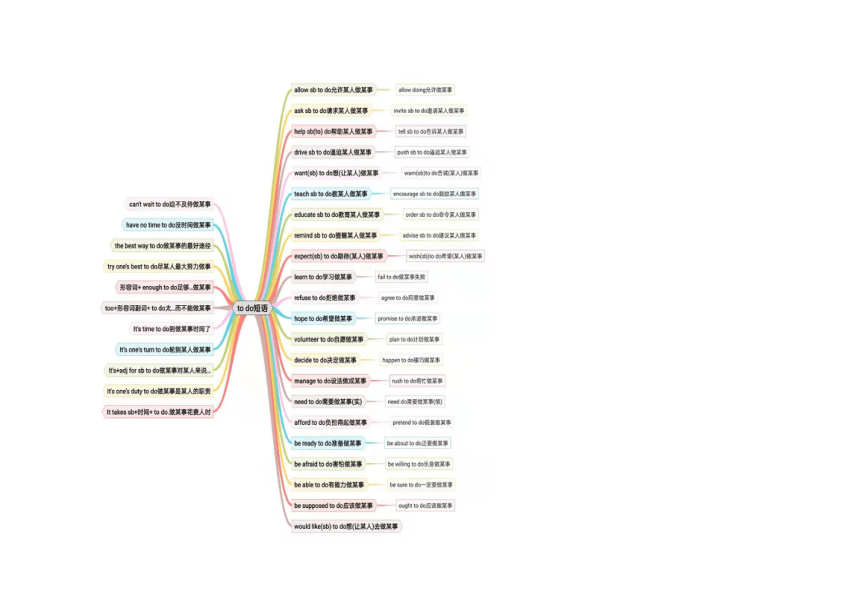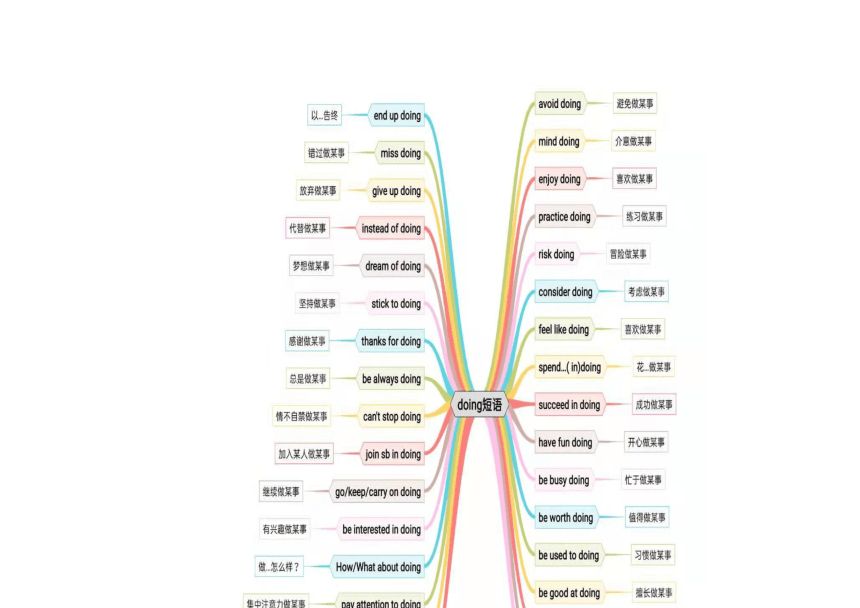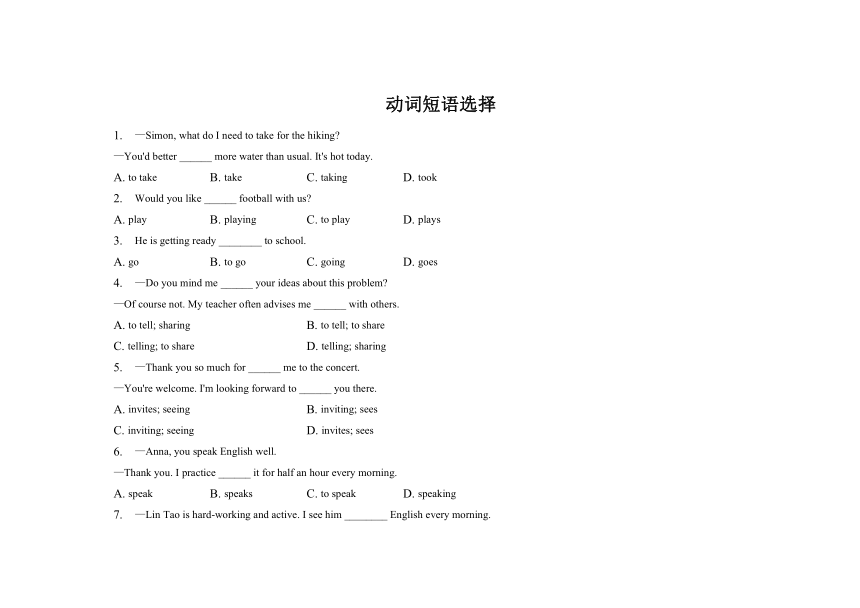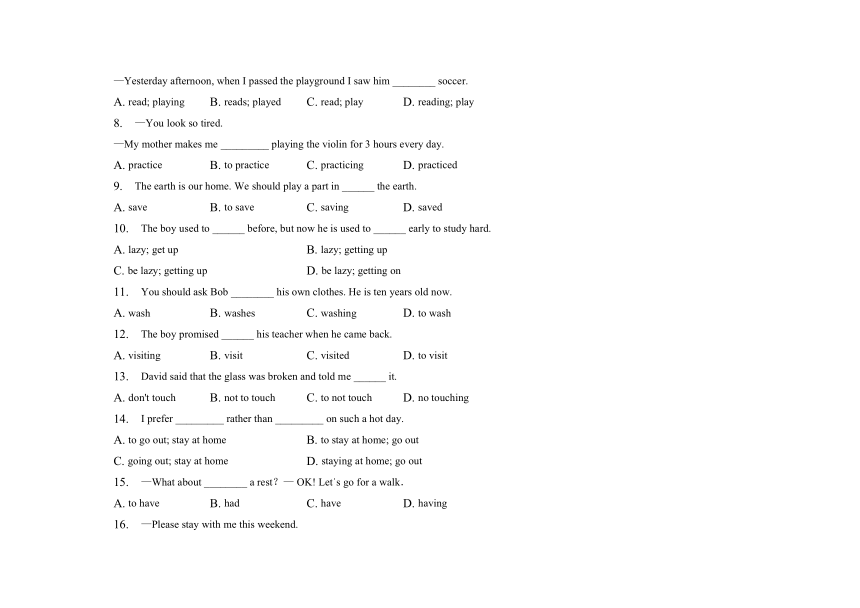2023年中考英语专项复习之动词短语(含答案)
文档属性
| 名称 | 2023年中考英语专项复习之动词短语(含答案) |

|
|
| 格式 | docx | ||
| 文件大小 | 524.8KB | ||
| 资源类型 | 教案 | ||
| 版本资源 | 人教新目标(Go for it)版 | ||
| 科目 | 英语 | ||
| 更新时间 | 2023-01-13 00:00:00 | ||
图片预览





文档简介
人教版九年级中考复习
动词短语专项
动词短语选择
1. —Simon, what do I need to take for the hiking
—You'd better ______ more water than usual. It's hot today.
A. to take B. take C. taking D. took
2. Would you like ______ football with us
A. play B. playing C. to play D. plays
3. He is getting ready ________ to school.
A. go B. to go C. going D. goes
4. —Do you mind me ______ your ideas about this problem
—Of course not. My teacher often advises me ______ with others.
A. to tell; sharing B. to tell; to share
C. telling; to share D. telling; sharing
5. —Thank you so much for ______ me to the concert.
—You're welcome. I'm looking forward to ______ you there.
A. invites; seeing B. inviting; sees
C. inviting; seeing D. invites; sees
6. —Anna, you speak English well.
—Thank you. I practice ______ it for half an hour every morning.
A. speak B. speaks C. to speak D. speaking
7. —Lin Tao is hard-working and active. I see him ________ English every morning.
—Yesterday afternoon, when I passed the playground I saw him ________ soccer.
A. read; playing B. reads; played C. read; play D. reading; play
8. —You look so tired.
—My mother makes me _________ playing the violin for 3 hours every day.
A. practice B. to practice C. practicing D. practiced
9. The earth is our home. We should play a part in ______ the earth.
A. save B. to save C. saving D. saved
10. The boy used to ______ before, but now he is used to ______ early to study hard.
A. lazy; get up B. lazy; getting up
C. be lazy; getting up D. be lazy; getting on
11. You should ask Bob ________ his own clothes. He is ten years old now.
A. wash B. washes C. washing D. to wash
12. The boy promised ______ his teacher when he came back.
A. visiting B. visit C. visited D. to visit
13. David said that the glass was broken and told me ______ it.
A. don't touch B. not to touch C. to not touch D. no touching
14. I prefer _________ rather than _________ on such a hot day.
A. to go out; stay at home B. to stay at home; go out
C. going out; stay at home D. staying at home; go out
15. —What about ________ a rest?— OK! Let s go for a walk.
A. to have B. had C. have D. having
16. —Please stay with me this weekend.
—I'm sorry, but my father and I planned ______ Beijing a long time ago.
A. visit B. visiting C. to visit D. visited
17. Look! There are some children _______ kites in the park. They re having a good time.
A. fly B. to fly C. flew D. flying
18. Remember ______ your homework to school tomorrow.
A. bring B. bringing C. to bring D. brings
19. ---Why do you look sleepy in class today
---Sorry, Mr. Borwn. I regret _____ up watching the World Cup in Qatar last night.
A. to stay B. staying C. stay D. stayed
20. You must be very tired. Why not a rest
A. to stop to have B. to stop having
C. stop to have D. stop having
21. You should ______ the blender when you finish ______ the juice.
A. turn on; to make B. turn off; to make
C. turn off; making D. turn on; making
22. It took Jane an hour_____ reading this interesting story.
A. to finish B. finish C. finishing D. finished
23. I think _____ important and necessary for students ____ housework with parents.
A. this; to share B. that; share
C. it; to share D. it; share
24. —Is Jack in the next room?
—Well,it's hard to say.But I heard him ______ loudly when I passed by just now.
A. speak B. to speak C. spoken D. speaking
25. Students shouldn't spend too much time ______ computer games.
A. play B. playing C. to play D. on playing
26. Daisy is considering ________ a new bed for her son. The old one is too small.
A. buy B. to buy C. buying D. bought
27. His father doesn’t allow him______swimming alone.
A. goes B. to go C. going D. go
28. He ran as fast as he could____ the bus but he failed.
A. catch B. to catch C. catches D. caught
29. I find______ difficult______ this problem by myself.
A. it;to work out B. it;working out
C. that;to work out D. that;working out
30. Don't worry.All the teachers will try _________ you with your study.
A. help B. to help C. helps D. helping
31. The Smiths have been away for two months.We are looking forward to_________ them.
A. learning from B. hearing from C. learn from D. hear from
32. Let's ______ sports.
A. To play B. plays C. playing D. play
33. We have worked so long. Shall we stop ______ a rest.
A. have B. to having C. having D. to have
34. This is a new machine. We can use the machine ______ the air clean.
A. make B. makes C. to make D. making
35. —Tom, why are you in such a hurry
—Oh, my bike is broken. I m going to have it ________.
A. repairing B. repaired C. to repair D. repair
36. My mother expects ________ around the world.
A. to go B. going C. goes D. went
37. The girl is often heard ________ in the music room. Her voice sounds beautiful.
A. practice to sing B. practice singing
C. to practice to sing D. to practice singing
38. —Why didn't you stop him from ______ on the wall
—I’m sorry. I was reading a book in the bedroom at that time.
A. to draw B. drawing C. drew D. draw
39. —Joe, thanks for _________ me this tennis bat.
—You re welcome.
A. buy B. to buy C. buys D. buying
40. He refused ________ me with my schoolwork so I was very upset.
A. to help B. helping C. helped D. help
41. We stopped ______, but there was not any sound.
A. to listen B. listens C. listen D. listening
42. We consider ________ the Great Wall this summer holiday.
A. to visit B. visit
C. to be visiting D. visiting
43. Danny noticed the teacher ________ towards him and stopped talking with his classmates.
A. walking B. to walk C. to walking D. walks
44. My parents often tell me that time is money, and I’m always educated ________ my time wisely.
A. use B. using C. to use D. used
45. Trees can protect our environment and give out oxygen, so we should take action to stop people ________ them down.
A. from cut B. to cut C. from cutting D. to cutting
46. We can learn English well by ______ the tapes.
A. listen to B. listen C. listening D. listening to
47. The boss ordered his workers ________ for him over 12 hours a day.
A. to work B. working C. work D. works
48. She had trouble ________ clothes because her arms were injured (受伤的).
A. wash B. to wash C. washing D. to washing
49. The palace is worth ______.
A. visit B. visited C. to visit D. visiting
50. The writer advised us ______ more.
A. read B. reading C. to read D. reads
答案
1.B句意:——西蒙,为了徒步旅行我需要带什么?——你最好比平常多带些水。今天非常热。had better do sth.最好做某事,固定搭配,故选B。
2.C句意:你愿意和我们一起踢足球吗?would you like to do sth表示你想做某事吗。故选C。
3.B
4.C句意:——你介意我谈谈你对这个问题的看法吗?——当然不会。我的老师经常建议我和别人分享。根据题干,可知第一空考查mind sb doing sth,介意做某事;第二空考查advise sb to do sth,建议某人去做某事,故选:C。
5.【答案】C
【解析】句意:——非常感谢你邀请我来音乐会。——不客气。我盼望着在那里见到你。这两个空前的for和to都是介词,后面都应用动名词形式作宾语。
6.D句意:——安娜,你英语说得很好。——谢谢你!我每天早上练习说半小时英语。practice doing sth.意为“练习做某事”,故选D。
7.A句意:——林涛勤奋又活跃。我看到他每天早上读英语。——昨天下午,当我路过操场的时候,我看到他正在踢足球。根据see sb. do sth.和see sb. doing sth.的区别可知,第一空要填的是动词原形read,第二空要填的是playing,故答案为A。
8.A句意:——你看起来很疲。——我妈妈让我每天练习弹2个小时的钢琴.根据My mother makes me_____________ playing the piano for 2 hours every day .可知这里make sb. do sth.表示让某人做某事。此处要用省略to的不定式作宾补。故选A。
9.C句意:地球是我们的家。我们应该在拯救地球中发挥作用。play a part in doing sth.在做某事中起作用,为固定搭配。故选C。
10.C句意:这个男孩以前很懒,但现在他习惯早起努力学习。used to do sth.过去常常做某事;be used to doing sth.习惯做某事。根据before可知,第一句指的是“这个男孩以前很懒”,因为lazy形容词,懒惰的,因此第一空用be lazy;get up起床,get on上车;该处指的是“现在他习惯早起努力学习”,因此用getting up。
11.D句意:你应该让Bob洗他自己的衣服。现在他已经十岁了。根据空格前的关键词ask Bob,再结合选项可知,此处意为“让Bob洗他自己的衣服”,ask sb. to do sth.为固定搭配,意为“要求某人做某事”。故选D。
12.D句意:那个男孩答应回来时去看望他的老师。promise to do sth.答应做某事,固定句型,故选D。
13.B句意:大卫说玻璃碎了,告诉我不要碰它。tell sb. (not) to do sth.告诉某人(不要)做某事,固定用法,所以此处用not to touch。
14.B句意:这么热的天,我宁愿呆在家里也不愿出去。stay at home呆在家里,go out出去。prefer to do sth. rather than do sth.意为:宁愿做某事而不愿做另一件事。15.D句意:——休息一会儿怎么样?——好的!让我们去散步吧.在英语中.What/How about译为…怎么样,后面+doing,about在此是介词,have a rest译为休息,根据句中的关键词What about可知,此处应用having,故选D。
16.C句意:——这个周末请留在我身边。——对不起,很久以前我和父亲就计划去北京玩了。plan to do sth.计划做某事,固定搭配。故选C。
17.D
18.C句意:记住明天把你的家庭作业带到学校来。remember to do sth,记住去做某事,事情未做;remember doing sth记住做某事,事情已做。根据tomorrow可知事情未做,用不定式作宾语。
19.B
20.C句意:你一定很累了。为什么不停下来去休息一下呢?由于Why not后接动词原形,故排除A和B;stop to do sth停下来去做某事;stop doing sth停止做某事。结合语境You must be very tired.“你肯定非常累了。”"可知建议停止手中的活去休息一下,即停下来去做某事,故用stop to have,故选C。
21.C句意:榨完果汁后,你应该把搅拌机关掉。turn on打开;turn off关掉。finish doing的意思是结束正在做的事;finish to do的意思是结束目前所做的事情,去做其他的事。本句是说榨完果汁后,你应该把搅拌机关掉,用finish doing。故选C。
22.A句意:简花了一个小时读完了这个有趣的故事。该句为it takes sb some time to do sth“做某事花费某人多少时间”,it是形式主语,动词不定式做真正的主语,因此用to finish。
23.C句意:我认为学生与父母分担家务是很重要和必要的。this这个;that那个;it它。该句为" think it adj + for sb. to do sth"结构,表示...认为对某人来说做某事是……,it代替to do不定式作形式宾语,动词不定式to do做真正的宾语。因此第一空用it,第二空用to share。
24.D句意:——杰克在隔壁房间?——很难说,但我刚才经过时,听到他在大声说话。hear sb.do sth表示“听到某人做了某事”或“经常听到某人做某事;hear sb.doing sth表示“听到某人正在做某事”,根据句意可知,故选D。
25.B句意:学生不应该花太多时间玩电脑游戏。根据题干,可知考查spend...(in) doing sth花费……做某事。故选B。
26.C句意:黛西正在考虑给儿子买一张新床。旧的太小了。consider doing sth考虑做某事,固定搭配。此处是动名词作宾语。故选C。
27.B句意:他的父亲不允许他独自去游泳。固定短语allow sb to do sth允许某人做某事。故选B。
28.B句意:他尽可能快地跑去赶公共汽车,但他失败了。catch赶上,动词原形;to catch不定式;catches第三人称单数;caught过去式。as fast as he could"尽可能快",修饰动词ran。这里用不定式to catch表示目的。故选B。
29.A句意:我发现自己很难解决这个问题。分析题干可知,本句为sb find(s) it+形容词+to do sth固定句型,意为"某人发现做某事怎么样",it为形式宾语,真正的宾语是to do不定式,因此第一个空格选it;第二个空格选to work out。
30.B句意:别担心。所有的老师都会尽力帮助你学习。try to do sth“尽力做某事”,固定搭配;try doing sth.“尝试做某事”,固定搭配。根据Don't worry.可知,所有的老师都会尽力帮助你学习,所以不用担心。故选B。
31.Blook forwrd to(期盼),to是介词,后面跟名词或者动名词,排除C和D;前面说了他们离开两个月了,所以这里是期盼"收到他们的来信(hearing from them)",而不是"向他们学习(learning from them)",排除A。故选:B。
32.D句意:我们来做运动吧。让某人做某事let sb do sth,固定短语,Let's后接动词原形。
33.D句意:我们工作了这么久。我们停下来休息一下好吗?stop to do sth.表示停下去去做某事,而stop doing sth.表示停止正在做的某事;根据We have worked so long.可知,我们已经工作了很长时间,所以要停下来休息一下,故此处应为固定短语stop to do sth.。故选D。
34.C句意:这是一台新机器。我们可以使用这台机器来使空气变干净。use...to do sth.意为“使用……做某事”,故答案为C。
35.B考查非谓语动词的用法。have sth. done意为“让某事被做;某物遭受……”。根据空格所在句句意“我将让别人修理它。”可知,自行车是被修理,bike和repair之间是被动关系,用过去分词表示被动,故选B。
36.A用固定搭配法。expect to do sth.期盼做某事。
37.D句意:这个女孩经常被听到在音乐室里练习唱歌。她的声音听起来很美。hear sb. do sth.听见某人做某事,固定短语;其被动结构是be heard to do sth.,可排除A和B。practice doing练习做某事,因此sing用动名词singing,故选D。
38.B句意:——你为什么不阻止他在墙上画画?——对不起。当时我正在卧室里看书。stop sb from doing sth 阻止某人做某事,是固定短语,因from是介词,故后面跟动名词,故选B
39.D句意:——乔,谢谢你给我买了这个网球拍。——不客气。thanks for doing sth感谢做某事,为固定搭配,所以空处需填动名词buying作宾语。故选D。
40.A句意:他拒绝帮我做作业,所以我很沮丧。refuse to do sth.拒绝做某事,后跟不定式to help作宾语。
41.A句意:我们停下来听,但是没有任何声音。stop to do sth 停下来去做某事;stop doing sth 停止做某事,根据后面一句“没有任何声音”,可以推测出前一句为“我们停下来听”,应选to listen,故选:A。
42.D句意:这个暑假我们考虑参观长城。consider doing sth.意为“考虑做某事”,故选D。
43.A
44.C句意:我的父母亲经常告诉我时间就是金钱,我总是被教育要明智地使用时间。use,用,使用,动词。A.use动词原形;B.using现在分词或动名词;C.to use动词不定式;D.used过去式或过去分词。be educated to do sth.被教育做某事,所以本空填动词不定式。故选C。
45.C句意:树木能够保护我们的环境和释放氧气,我们应该采取行动阻止人们砍伐树木。“stop…from doing sth.”意为“阻止……做某事”。根据句意,答案为C。
46.D考查动词的形式。介词后的动词要用-ing形式,by是介词,另外listen是不及物动词,其后要接to才能带宾语,故选D。
47.A考查动词order的用法。order sb. to do sth. 意为“命令某人做某事”,故选A。
48.C句意:她洗衣服有困难,因为她的胳膊受伤了。have trouble (in) doing sth. 为固定搭配,意为“做某事有困难”。故选C。
49.D
50.Cadvise sb. to do sth. 意为“建议某人做某事”,是固定结构
动词短语专项
动词短语选择
1. —Simon, what do I need to take for the hiking
—You'd better ______ more water than usual. It's hot today.
A. to take B. take C. taking D. took
2. Would you like ______ football with us
A. play B. playing C. to play D. plays
3. He is getting ready ________ to school.
A. go B. to go C. going D. goes
4. —Do you mind me ______ your ideas about this problem
—Of course not. My teacher often advises me ______ with others.
A. to tell; sharing B. to tell; to share
C. telling; to share D. telling; sharing
5. —Thank you so much for ______ me to the concert.
—You're welcome. I'm looking forward to ______ you there.
A. invites; seeing B. inviting; sees
C. inviting; seeing D. invites; sees
6. —Anna, you speak English well.
—Thank you. I practice ______ it for half an hour every morning.
A. speak B. speaks C. to speak D. speaking
7. —Lin Tao is hard-working and active. I see him ________ English every morning.
—Yesterday afternoon, when I passed the playground I saw him ________ soccer.
A. read; playing B. reads; played C. read; play D. reading; play
8. —You look so tired.
—My mother makes me _________ playing the violin for 3 hours every day.
A. practice B. to practice C. practicing D. practiced
9. The earth is our home. We should play a part in ______ the earth.
A. save B. to save C. saving D. saved
10. The boy used to ______ before, but now he is used to ______ early to study hard.
A. lazy; get up B. lazy; getting up
C. be lazy; getting up D. be lazy; getting on
11. You should ask Bob ________ his own clothes. He is ten years old now.
A. wash B. washes C. washing D. to wash
12. The boy promised ______ his teacher when he came back.
A. visiting B. visit C. visited D. to visit
13. David said that the glass was broken and told me ______ it.
A. don't touch B. not to touch C. to not touch D. no touching
14. I prefer _________ rather than _________ on such a hot day.
A. to go out; stay at home B. to stay at home; go out
C. going out; stay at home D. staying at home; go out
15. —What about ________ a rest?— OK! Let s go for a walk.
A. to have B. had C. have D. having
16. —Please stay with me this weekend.
—I'm sorry, but my father and I planned ______ Beijing a long time ago.
A. visit B. visiting C. to visit D. visited
17. Look! There are some children _______ kites in the park. They re having a good time.
A. fly B. to fly C. flew D. flying
18. Remember ______ your homework to school tomorrow.
A. bring B. bringing C. to bring D. brings
19. ---Why do you look sleepy in class today
---Sorry, Mr. Borwn. I regret _____ up watching the World Cup in Qatar last night.
A. to stay B. staying C. stay D. stayed
20. You must be very tired. Why not a rest
A. to stop to have B. to stop having
C. stop to have D. stop having
21. You should ______ the blender when you finish ______ the juice.
A. turn on; to make B. turn off; to make
C. turn off; making D. turn on; making
22. It took Jane an hour_____ reading this interesting story.
A. to finish B. finish C. finishing D. finished
23. I think _____ important and necessary for students ____ housework with parents.
A. this; to share B. that; share
C. it; to share D. it; share
24. —Is Jack in the next room?
—Well,it's hard to say.But I heard him ______ loudly when I passed by just now.
A. speak B. to speak C. spoken D. speaking
25. Students shouldn't spend too much time ______ computer games.
A. play B. playing C. to play D. on playing
26. Daisy is considering ________ a new bed for her son. The old one is too small.
A. buy B. to buy C. buying D. bought
27. His father doesn’t allow him______swimming alone.
A. goes B. to go C. going D. go
28. He ran as fast as he could____ the bus but he failed.
A. catch B. to catch C. catches D. caught
29. I find______ difficult______ this problem by myself.
A. it;to work out B. it;working out
C. that;to work out D. that;working out
30. Don't worry.All the teachers will try _________ you with your study.
A. help B. to help C. helps D. helping
31. The Smiths have been away for two months.We are looking forward to_________ them.
A. learning from B. hearing from C. learn from D. hear from
32. Let's ______ sports.
A. To play B. plays C. playing D. play
33. We have worked so long. Shall we stop ______ a rest.
A. have B. to having C. having D. to have
34. This is a new machine. We can use the machine ______ the air clean.
A. make B. makes C. to make D. making
35. —Tom, why are you in such a hurry
—Oh, my bike is broken. I m going to have it ________.
A. repairing B. repaired C. to repair D. repair
36. My mother expects ________ around the world.
A. to go B. going C. goes D. went
37. The girl is often heard ________ in the music room. Her voice sounds beautiful.
A. practice to sing B. practice singing
C. to practice to sing D. to practice singing
38. —Why didn't you stop him from ______ on the wall
—I’m sorry. I was reading a book in the bedroom at that time.
A. to draw B. drawing C. drew D. draw
39. —Joe, thanks for _________ me this tennis bat.
—You re welcome.
A. buy B. to buy C. buys D. buying
40. He refused ________ me with my schoolwork so I was very upset.
A. to help B. helping C. helped D. help
41. We stopped ______, but there was not any sound.
A. to listen B. listens C. listen D. listening
42. We consider ________ the Great Wall this summer holiday.
A. to visit B. visit
C. to be visiting D. visiting
43. Danny noticed the teacher ________ towards him and stopped talking with his classmates.
A. walking B. to walk C. to walking D. walks
44. My parents often tell me that time is money, and I’m always educated ________ my time wisely.
A. use B. using C. to use D. used
45. Trees can protect our environment and give out oxygen, so we should take action to stop people ________ them down.
A. from cut B. to cut C. from cutting D. to cutting
46. We can learn English well by ______ the tapes.
A. listen to B. listen C. listening D. listening to
47. The boss ordered his workers ________ for him over 12 hours a day.
A. to work B. working C. work D. works
48. She had trouble ________ clothes because her arms were injured (受伤的).
A. wash B. to wash C. washing D. to washing
49. The palace is worth ______.
A. visit B. visited C. to visit D. visiting
50. The writer advised us ______ more.
A. read B. reading C. to read D. reads
答案
1.B句意:——西蒙,为了徒步旅行我需要带什么?——你最好比平常多带些水。今天非常热。had better do sth.最好做某事,固定搭配,故选B。
2.C句意:你愿意和我们一起踢足球吗?would you like to do sth表示你想做某事吗。故选C。
3.B
4.C句意:——你介意我谈谈你对这个问题的看法吗?——当然不会。我的老师经常建议我和别人分享。根据题干,可知第一空考查mind sb doing sth,介意做某事;第二空考查advise sb to do sth,建议某人去做某事,故选:C。
5.【答案】C
【解析】句意:——非常感谢你邀请我来音乐会。——不客气。我盼望着在那里见到你。这两个空前的for和to都是介词,后面都应用动名词形式作宾语。
6.D句意:——安娜,你英语说得很好。——谢谢你!我每天早上练习说半小时英语。practice doing sth.意为“练习做某事”,故选D。
7.A句意:——林涛勤奋又活跃。我看到他每天早上读英语。——昨天下午,当我路过操场的时候,我看到他正在踢足球。根据see sb. do sth.和see sb. doing sth.的区别可知,第一空要填的是动词原形read,第二空要填的是playing,故答案为A。
8.A句意:——你看起来很疲。——我妈妈让我每天练习弹2个小时的钢琴.根据My mother makes me_____________ playing the piano for 2 hours every day .可知这里make sb. do sth.表示让某人做某事。此处要用省略to的不定式作宾补。故选A。
9.C句意:地球是我们的家。我们应该在拯救地球中发挥作用。play a part in doing sth.在做某事中起作用,为固定搭配。故选C。
10.C句意:这个男孩以前很懒,但现在他习惯早起努力学习。used to do sth.过去常常做某事;be used to doing sth.习惯做某事。根据before可知,第一句指的是“这个男孩以前很懒”,因为lazy形容词,懒惰的,因此第一空用be lazy;get up起床,get on上车;该处指的是“现在他习惯早起努力学习”,因此用getting up。
11.D句意:你应该让Bob洗他自己的衣服。现在他已经十岁了。根据空格前的关键词ask Bob,再结合选项可知,此处意为“让Bob洗他自己的衣服”,ask sb. to do sth.为固定搭配,意为“要求某人做某事”。故选D。
12.D句意:那个男孩答应回来时去看望他的老师。promise to do sth.答应做某事,固定句型,故选D。
13.B句意:大卫说玻璃碎了,告诉我不要碰它。tell sb. (not) to do sth.告诉某人(不要)做某事,固定用法,所以此处用not to touch。
14.B句意:这么热的天,我宁愿呆在家里也不愿出去。stay at home呆在家里,go out出去。prefer to do sth. rather than do sth.意为:宁愿做某事而不愿做另一件事。15.D句意:——休息一会儿怎么样?——好的!让我们去散步吧.在英语中.What/How about译为…怎么样,后面+doing,about在此是介词,have a rest译为休息,根据句中的关键词What about可知,此处应用having,故选D。
16.C句意:——这个周末请留在我身边。——对不起,很久以前我和父亲就计划去北京玩了。plan to do sth.计划做某事,固定搭配。故选C。
17.D
18.C句意:记住明天把你的家庭作业带到学校来。remember to do sth,记住去做某事,事情未做;remember doing sth记住做某事,事情已做。根据tomorrow可知事情未做,用不定式作宾语。
19.B
20.C句意:你一定很累了。为什么不停下来去休息一下呢?由于Why not后接动词原形,故排除A和B;stop to do sth停下来去做某事;stop doing sth停止做某事。结合语境You must be very tired.“你肯定非常累了。”"可知建议停止手中的活去休息一下,即停下来去做某事,故用stop to have,故选C。
21.C句意:榨完果汁后,你应该把搅拌机关掉。turn on打开;turn off关掉。finish doing的意思是结束正在做的事;finish to do的意思是结束目前所做的事情,去做其他的事。本句是说榨完果汁后,你应该把搅拌机关掉,用finish doing。故选C。
22.A句意:简花了一个小时读完了这个有趣的故事。该句为it takes sb some time to do sth“做某事花费某人多少时间”,it是形式主语,动词不定式做真正的主语,因此用to finish。
23.C句意:我认为学生与父母分担家务是很重要和必要的。this这个;that那个;it它。该句为" think it adj + for sb. to do sth"结构,表示...认为对某人来说做某事是……,it代替to do不定式作形式宾语,动词不定式to do做真正的宾语。因此第一空用it,第二空用to share。
24.D句意:——杰克在隔壁房间?——很难说,但我刚才经过时,听到他在大声说话。hear sb.do sth表示“听到某人做了某事”或“经常听到某人做某事;hear sb.doing sth表示“听到某人正在做某事”,根据句意可知,故选D。
25.B句意:学生不应该花太多时间玩电脑游戏。根据题干,可知考查spend...(in) doing sth花费……做某事。故选B。
26.C句意:黛西正在考虑给儿子买一张新床。旧的太小了。consider doing sth考虑做某事,固定搭配。此处是动名词作宾语。故选C。
27.B句意:他的父亲不允许他独自去游泳。固定短语allow sb to do sth允许某人做某事。故选B。
28.B句意:他尽可能快地跑去赶公共汽车,但他失败了。catch赶上,动词原形;to catch不定式;catches第三人称单数;caught过去式。as fast as he could"尽可能快",修饰动词ran。这里用不定式to catch表示目的。故选B。
29.A句意:我发现自己很难解决这个问题。分析题干可知,本句为sb find(s) it+形容词+to do sth固定句型,意为"某人发现做某事怎么样",it为形式宾语,真正的宾语是to do不定式,因此第一个空格选it;第二个空格选to work out。
30.B句意:别担心。所有的老师都会尽力帮助你学习。try to do sth“尽力做某事”,固定搭配;try doing sth.“尝试做某事”,固定搭配。根据Don't worry.可知,所有的老师都会尽力帮助你学习,所以不用担心。故选B。
31.Blook forwrd to(期盼),to是介词,后面跟名词或者动名词,排除C和D;前面说了他们离开两个月了,所以这里是期盼"收到他们的来信(hearing from them)",而不是"向他们学习(learning from them)",排除A。故选:B。
32.D句意:我们来做运动吧。让某人做某事let sb do sth,固定短语,Let's后接动词原形。
33.D句意:我们工作了这么久。我们停下来休息一下好吗?stop to do sth.表示停下去去做某事,而stop doing sth.表示停止正在做的某事;根据We have worked so long.可知,我们已经工作了很长时间,所以要停下来休息一下,故此处应为固定短语stop to do sth.。故选D。
34.C句意:这是一台新机器。我们可以使用这台机器来使空气变干净。use...to do sth.意为“使用……做某事”,故答案为C。
35.B考查非谓语动词的用法。have sth. done意为“让某事被做;某物遭受……”。根据空格所在句句意“我将让别人修理它。”可知,自行车是被修理,bike和repair之间是被动关系,用过去分词表示被动,故选B。
36.A用固定搭配法。expect to do sth.期盼做某事。
37.D句意:这个女孩经常被听到在音乐室里练习唱歌。她的声音听起来很美。hear sb. do sth.听见某人做某事,固定短语;其被动结构是be heard to do sth.,可排除A和B。practice doing练习做某事,因此sing用动名词singing,故选D。
38.B句意:——你为什么不阻止他在墙上画画?——对不起。当时我正在卧室里看书。stop sb from doing sth 阻止某人做某事,是固定短语,因from是介词,故后面跟动名词,故选B
39.D句意:——乔,谢谢你给我买了这个网球拍。——不客气。thanks for doing sth感谢做某事,为固定搭配,所以空处需填动名词buying作宾语。故选D。
40.A句意:他拒绝帮我做作业,所以我很沮丧。refuse to do sth.拒绝做某事,后跟不定式to help作宾语。
41.A句意:我们停下来听,但是没有任何声音。stop to do sth 停下来去做某事;stop doing sth 停止做某事,根据后面一句“没有任何声音”,可以推测出前一句为“我们停下来听”,应选to listen,故选:A。
42.D句意:这个暑假我们考虑参观长城。consider doing sth.意为“考虑做某事”,故选D。
43.A
44.C句意:我的父母亲经常告诉我时间就是金钱,我总是被教育要明智地使用时间。use,用,使用,动词。A.use动词原形;B.using现在分词或动名词;C.to use动词不定式;D.used过去式或过去分词。be educated to do sth.被教育做某事,所以本空填动词不定式。故选C。
45.C句意:树木能够保护我们的环境和释放氧气,我们应该采取行动阻止人们砍伐树木。“stop…from doing sth.”意为“阻止……做某事”。根据句意,答案为C。
46.D考查动词的形式。介词后的动词要用-ing形式,by是介词,另外listen是不及物动词,其后要接to才能带宾语,故选D。
47.A考查动词order的用法。order sb. to do sth. 意为“命令某人做某事”,故选A。
48.C句意:她洗衣服有困难,因为她的胳膊受伤了。have trouble (in) doing sth. 为固定搭配,意为“做某事有困难”。故选C。
49.D
50.Cadvise sb. to do sth. 意为“建议某人做某事”,是固定结构
同课章节目录
- 词法
- 名词
- 动词和动词短语
- 动词语态
- 动词时态
- 助动词和情态动词
- 非谓语动词
- 冠词
- 代词
- 数词和量词
- 形容词副词及其比较等级
- 介词和介词短语
- 连词和感叹词
- 构词法
- 相似、相近词比较
- 句法
- 陈述句
- 一般疑问句和否定疑问句
- 特殊疑问句及选择疑问句
- 反意疑问句
- 存在句(There be句型)
- 宾语从句
- 定语从句
- 状语从句
- 主谓一致问题
- 简单句
- 并列句
- 复合句
- 主谓一致
- 主、表语从句
- 名词性从句
- 直接引语和间接引语
- 虚拟语气
- 感叹句
- 强调句
- 倒装句
- 祈使句
- 句子的成分
- 句子的分类
- 题型专区
- 单项选择部分
- 易错题
- 完形填空
- 阅读理解
- 词汇练习
- 听说训练
- 句型转换
- 补全对话
- 短文改错
- 翻译
- 书面表达
- 任务型阅读
- 语法填空
- 其他资料
